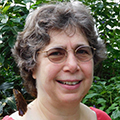The Entomological Society of America (ESA) revealed the winners of its 2017 awards, which recognize scientists, educators and students who have distinguished themselves through their contributions to entomology.
The winners will be honored at Entomology 2017, the organization’s annual meeting that will take place Nov. 5-8, in Denver, Colo.
Check out the 2017 ESA professional award winners:
Award For Excellence in Integrated Pest Management
This award, which is sponsored by Syngenta Crop Protection, is based on outstanding contributions that have a direct relation to integrated pest management (IPM).
 Dr. Elizabeth (Betsy) Beers is a professor of entomology at Washington State University, located at the Tree Fruit Research & Extension Center in Wenatchee, Wash. She earned her Ph.D. in entomology at Penn State under the direction of Dr. Larry Hull. Dr. Beers’ program has covered various aspects of tree fruit research and extension for the past 32 years at the heart of one of the largest and most innovative tree fruit industries in the nation, according to the ESA.
Dr. Elizabeth (Betsy) Beers is a professor of entomology at Washington State University, located at the Tree Fruit Research & Extension Center in Wenatchee, Wash. She earned her Ph.D. in entomology at Penn State under the direction of Dr. Larry Hull. Dr. Beers’ program has covered various aspects of tree fruit research and extension for the past 32 years at the heart of one of the largest and most innovative tree fruit industries in the nation, according to the ESA.
Her research and outreach program during this time had adapted to the needs of the industry, and although the target pest has changed over time, the approach has always worked toward a broad-based IPM program, the ESA says. Early work focused on secondary pests, where the opportunity for partial or complete biological control is the greatest. Pests included aphids, leafhoppers and leafminers, some of which were reduced to non-pest status.
Distinguished Achievement Award in Extension
This annual award recognizes outstanding contributions to extension entomology.
 Carol Black, pesticide education specialist at Washington State University, won this annual award that recognizes outstanding contributions to extension entomology. Black directs the Urban IPM and Pesticide Safety Education Program (PSEP). She received her bachelor’s degree in agricultural biology and pest management from New Mexico State University, and a master’s degree in forest insect ecology from Washington State University.
Carol Black, pesticide education specialist at Washington State University, won this annual award that recognizes outstanding contributions to extension entomology. Black directs the Urban IPM and Pesticide Safety Education Program (PSEP). She received her bachelor’s degree in agricultural biology and pest management from New Mexico State University, and a master’s degree in forest insect ecology from Washington State University.
Her self‐supported program is a national model for self‐sustained extension programming. It serves a wide array of clientele: farmers, foresters, public health professionals, aerial applicators, pest management professionals and landscape managers, according to the ESA. The program covers the fundamentals of pesticide laws, product labeling, personal safety, resistance management and environmental protection —
including pollinators, beneficial insects, surface and groundwater and more. The ESA says PSEP reaches over 4,500 professional applicators/growers through pesticide recertification and pre-license training courses across Washington State annually.
She also manages the Environmental Protection Agency’s (EPA’s) Pesticide Regulatory Education Program, which provides professional development to state, territory and tribal program managers and senior scientists. Black helped found the National Stakeholder Team for Pesticide Safety Education Program Funding and developed much of the baseline data and reports. Her national and international work on pesticide spray drift and personal protective equipment has resulted in changes to national policy.
Distinguished Achievement Award in Horticultural Entomology
This award honors any entomologist who has contributed to the American horticulture industry.
 Dr. David Smitley is a full professor and Michigan State University extension specialist working closely with the turfgrass, nursery, landscape and floriculture industries to identify and solve insect pest problems. In 1991, Dr. Smitley worked with Forest Service colleagues to introduce Entomophaga maimaiga, a natural fungal pathogen of gypsy moth, into Michigan, precipitating a widespread collapse of gypsy moth throughout the state over the next eight years.
Dr. David Smitley is a full professor and Michigan State University extension specialist working closely with the turfgrass, nursery, landscape and floriculture industries to identify and solve insect pest problems. In 1991, Dr. Smitley worked with Forest Service colleagues to introduce Entomophaga maimaiga, a natural fungal pathogen of gypsy moth, into Michigan, precipitating a widespread collapse of gypsy moth throughout the state over the next eight years.
In 1999, Dr. Smitley introduced a pathogen of Japanese beetle, Ovavesicula popilliae, into Michigan and followed the establishment and impact at eight locations over a 15-year period. Results indicate a high correlation between the build-up of O. popilliae and a 75 percent decline in Japanese beetle populations during the 15-year study period, according to the ESA.
In the last 16 years, he worked extensively with Arborjet Inc. on the initial development and testing of the most widely used treatment to protect trees from emerald ash borer; trunk injection with emamectin benzoate (TREEäge). During the same time period a series of field trials led to publications that explain how imidacloprid can provide a consistently high level of protection against emerald ash borer when applied as a basal soil drench. This gives homeowners a much-needed tool to protect urban trees using products available at local garden centers.
In 2014, Dr. Smitley began work with nursery and greenhouse growers to develop practices for producing high-quality plants that are safe for pollinators. That led to a joint effort with Steve Frank in 2016 to organize the first national conference on “Protecting Pollinators in Ornamental Landscapes.” Stimulated by the conference, Dr. Smitley led a team of entomologists to publish “Protecting and Enhancing Pollinators in Urban Landscapes.”
Distinguished Achievement Award in Teaching
This award is presented annually to the member of the ESA deemed to be the most outstanding teacher of the year.
 Dr. Wyatt Hoback, assistant professor of entomology at Oklahoma State University, has been teaching undergraduate and graduate entomology courses for 18 years. He received his Ph.D. degree in entomology from the University of Nebraska—Lincoln and a master’s degree in biology from Missouri State University. He taught traditional and online classes in entomology and biology for 15 years in the University of Nebraska system. At OSU, he teaches a non-majors course titled “Insects and Society” to more than 700 students each year. He wrote an online textbook for the course and engages students with a variety of projects that allow them to see the critical roles that insects have played in human history and how insects affect modern food production, health and the environment.
Dr. Wyatt Hoback, assistant professor of entomology at Oklahoma State University, has been teaching undergraduate and graduate entomology courses for 18 years. He received his Ph.D. degree in entomology from the University of Nebraska—Lincoln and a master’s degree in biology from Missouri State University. He taught traditional and online classes in entomology and biology for 15 years in the University of Nebraska system. At OSU, he teaches a non-majors course titled “Insects and Society” to more than 700 students each year. He wrote an online textbook for the course and engages students with a variety of projects that allow them to see the critical roles that insects have played in human history and how insects affect modern food production, health and the environment.
Recognition Award in Entomology
 Dr. Alvin M. Simmons is a research entomologist with the USDA-ARS U.S. Vegetable Laboratory in Charleston, S.C., and is the 2017 recipient of the ESA Recognition Award in Entomology. Simmons has a bachelor’s degree in biology from East Carolina University, and master’s and doctorate degree in entomology from the University of Kentucky.
Dr. Alvin M. Simmons is a research entomologist with the USDA-ARS U.S. Vegetable Laboratory in Charleston, S.C., and is the 2017 recipient of the ESA Recognition Award in Entomology. Simmons has a bachelor’s degree in biology from East Carolina University, and master’s and doctorate degree in entomology from the University of Kentucky.
Simmons conducts research on sustainable approaches for pest management in specialty crops, and serves as interim coordinator for USDA-ARS Minor Use Pesticide Program for Food and Ornamental Horticulture.
Nan-yao Su Award for Innovation and Creativity in Entomology
Each year this award is given to an ESA member who is able to demonstrate an ability to identify problems and develop creative, alternative solutions that significantly impact entomology.
 Dr. Subba Reddy Palli is a professor of entomology at the University of Kentucky. He is internationally recognized for his research on hormonal regulation of molting, metamorphosis and reproduction, development of ecdysone receptor-based gene switches, and RNAi-based pest management.
Dr. Subba Reddy Palli is a professor of entomology at the University of Kentucky. He is internationally recognized for his research on hormonal regulation of molting, metamorphosis and reproduction, development of ecdysone receptor-based gene switches, and RNAi-based pest management.
Palli has published 170 journal articles and book chapters and co-edited a book. He received his doctorate from the University of Western Ontario and trained as a postdoctoral fellow at the University of Washington. Subsequently, Palli worked at the Canadian Forest Service and Rohm and Hass Company. He joined the University of Kentucky’s Department of Entomology in 2002; currently, he serves as the chair of this department. Palli also serves as the co-director of the Center for Arthropod Management Technologies, NSF Industry and University Cooperative Research Center.
Recognition Award in Insect Physiology, Biochemistry & Toxicology
 Dr. Mariana Federica Wolfner is the Goldwin Smith Professor of Molecular Biology and Genetics, and a Stephen H. Weiss Presidential Fellow at Cornell University. After receiving her bachelor’s degree in biology and chemistry from Cornell, she did doctoral research in biochemistry at Stanford University, and postdoctoral work at the University of California, San Diego.
Dr. Mariana Federica Wolfner is the Goldwin Smith Professor of Molecular Biology and Genetics, and a Stephen H. Weiss Presidential Fellow at Cornell University. After receiving her bachelor’s degree in biology and chemistry from Cornell, she did doctoral research in biochemistry at Stanford University, and postdoctoral work at the University of California, San Diego.
Dr. Wolfner studies the molecular, genetic and physiological underpinnings of reproduction and fertility. After graduate and postdoctoral studies that identified critical genes in Drosophila’s steroid-response and sex determination, respectively, Dr. Wolfner established her lab at Cornell. There, she and her students and postdocs utilized molecular genetics to show that males’ seminal proteins modulate the physiology, behavior, and longevity of mated female Drosophila, and Aedes mosquitoes.
Recognition Award in Urban Entomology
This award recognizes and encourages outstanding extension, research and teaching contributions in urban entomology.
 Dr. Brian T. Forschler is professor of entomology at the University of Georgia, and P.I. for the Household and Structural Entomology Research Program. He received three higher degrees, all in entomology specializing in insect pathology, with bachelor’s and master’s degrees from the University of Kentucky, as well as a doctorate from the University of Georgia.
Dr. Brian T. Forschler is professor of entomology at the University of Georgia, and P.I. for the Household and Structural Entomology Research Program. He received three higher degrees, all in entomology specializing in insect pathology, with bachelor’s and master’s degrees from the University of Kentucky, as well as a doctorate from the University of Georgia.
Dr. Forschler has a teaching and research appointment that includes teaching graduate and undergraduate-level courses on urban entomology and IPM. Dr. Forschler is chairperson for the Termiticide Scientific Review Panel and is a member of the ASPCRO Termiticide Label Review Committee and the Georgia Department of Agriculture Structural Pest Control Commission. He has had cooperative research agreements with Madihol University in Bangkok, Thailand; The RISH Institute at Kyoto University; the BAM Institute in Berlin, Germany; and the Vietnam Academy for Water Resources in Hanoi, Vietnam. He has organized 13 national and international symposia on urban insect pest biology/management, according to the ESA. He is author of more than 100 scientific and popular press articles on household and structural insect pests and has conducted training sessions for industry and regulatory officials in the United States, Europe, Australia, and Asia.
Thomas Say Award
This ESA award acknowledges significant and outstanding work in the fields of insect systematics, morphology or evolution.
 Dr. Michael S. Engel grew up in the 1970s exploring the environs about his family’s homes in California and Arizona. He eventually matriculated at the University of Kansas, receiving a bachelor’s degree in physiology and cell biology and a bachelor’s degree in chemistry. He then proceeded to Cornell University, where he obtained a doctorate degree in systematic entomology. He served as a research scientist at the American Museum of Natural History in New York for two years before returning to the University of Kansas, where he is a professor in the Department of Ecology and Evolutionary Biology, as well as a senior curator in the Natural History Museum’s Division of Entomology.
Dr. Michael S. Engel grew up in the 1970s exploring the environs about his family’s homes in California and Arizona. He eventually matriculated at the University of Kansas, receiving a bachelor’s degree in physiology and cell biology and a bachelor’s degree in chemistry. He then proceeded to Cornell University, where he obtained a doctorate degree in systematic entomology. He served as a research scientist at the American Museum of Natural History in New York for two years before returning to the University of Kansas, where he is a professor in the Department of Ecology and Evolutionary Biology, as well as a senior curator in the Natural History Museum’s Division of Entomology.
Dr. Engel is an internationally recognized systematic entomologist and invertebrate paleontologist, working broadly on the evolutionary history of arthropods and most widely known for co-authoring Evolution of the Insects. His research has contributed to an understanding of the geological history, phylogenetic relationships, past and present diversity, and evolution of many insect and related arthropod lineages, conducting work in 40 countries. He is also known for his studies on the systematics and biology of modern bees and Zoraptera.
Photos: ESA
Leave A Comment